Leadership and Management for Service Industries : Assignment Solution
VerifiedAdded on 2021/02/20
|16
|5410
|61
AI Summary
Contribute Materials
Your contribution can guide someone’s learning journey. Share your
documents today.
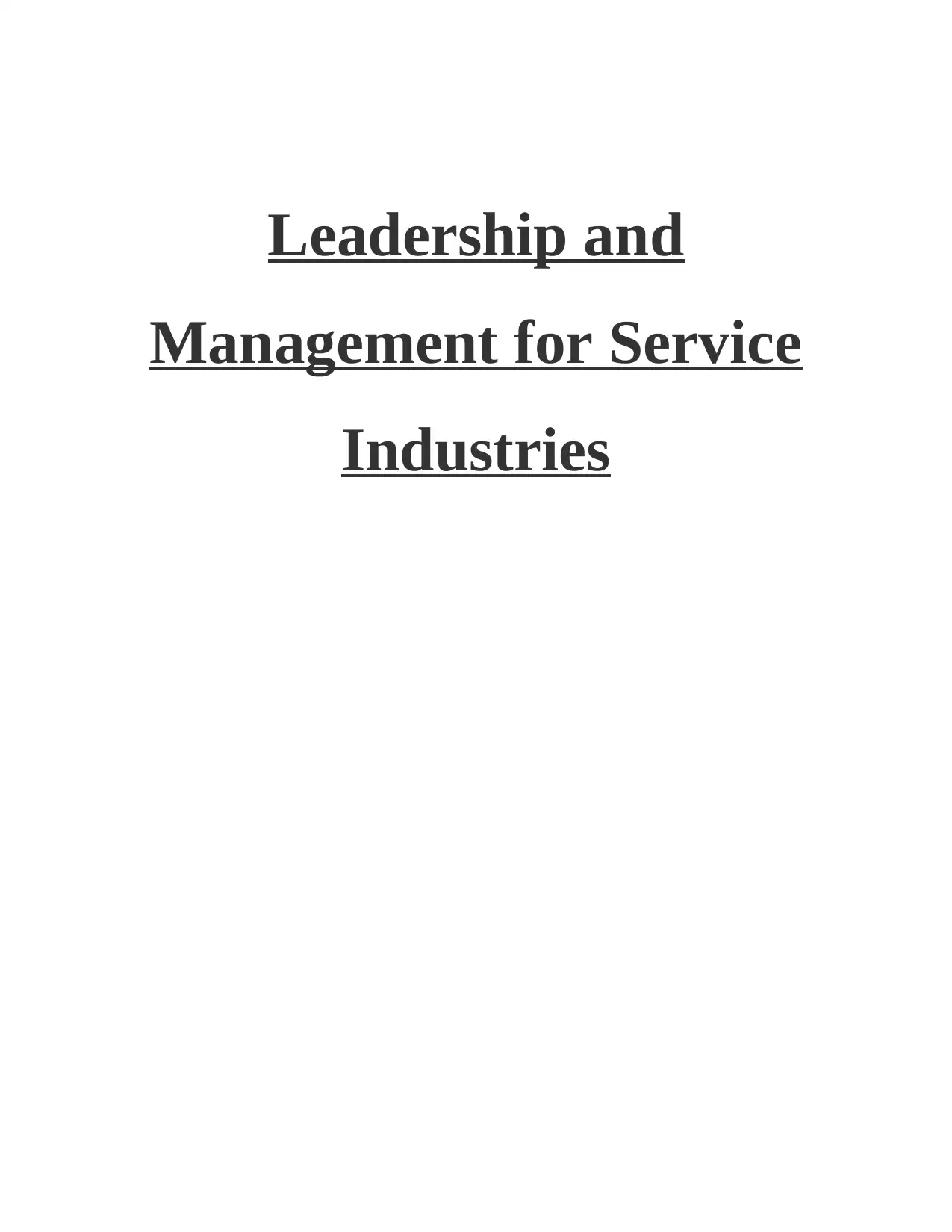
Leadership and
Management for Service
Industries
Management for Service
Industries
Secure Best Marks with AI Grader
Need help grading? Try our AI Grader for instant feedback on your assignments.
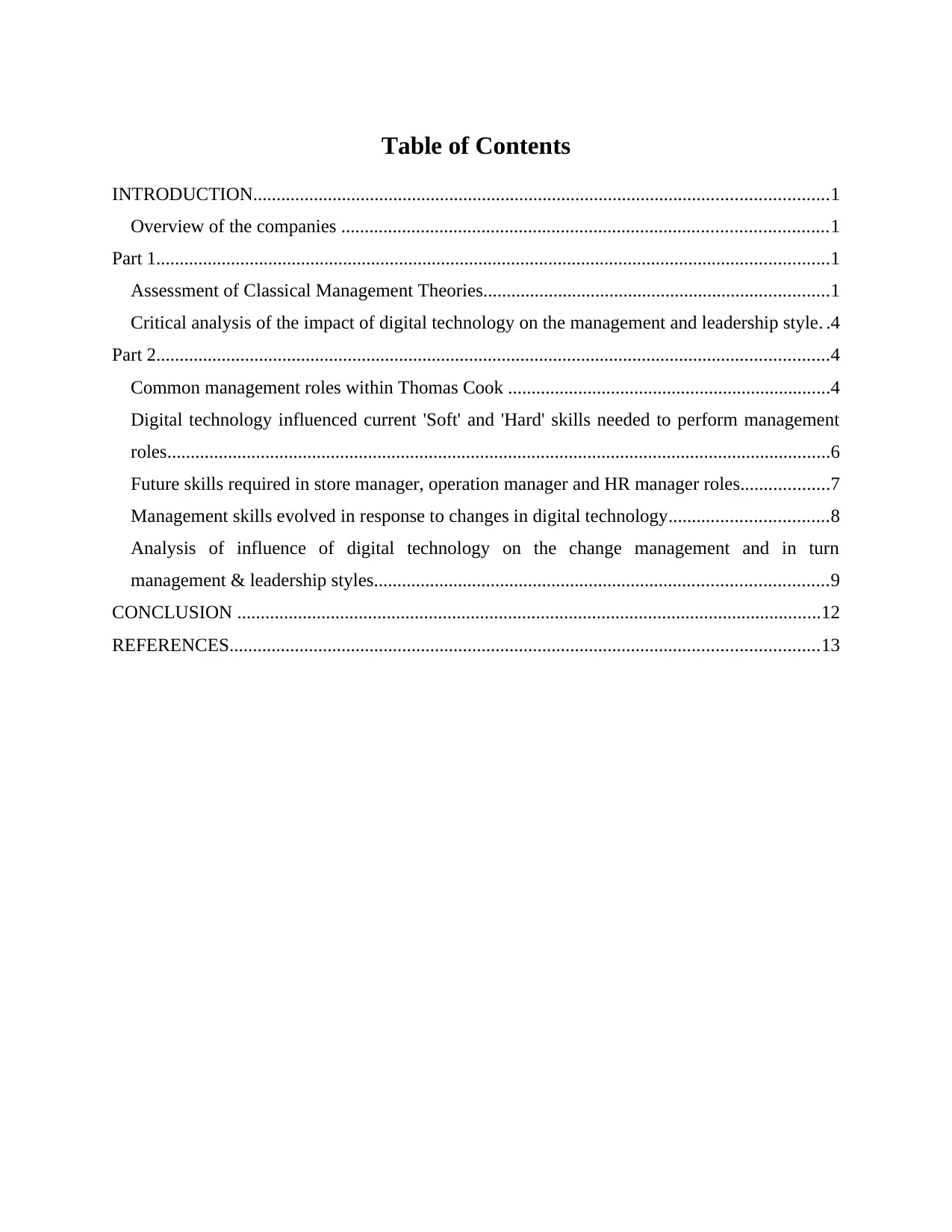
Table of Contents
INTRODUCTION...........................................................................................................................1
Overview of the companies ........................................................................................................1
Part 1................................................................................................................................................1
Assessment of Classical Management Theories..........................................................................1
Critical analysis of the impact of digital technology on the management and leadership style. .4
Part 2................................................................................................................................................4
Common management roles within Thomas Cook .....................................................................4
Digital technology influenced current 'Soft' and 'Hard' skills needed to perform management
roles..............................................................................................................................................6
Future skills required in store manager, operation manager and HR manager roles...................7
Management skills evolved in response to changes in digital technology..................................8
Analysis of influence of digital technology on the change management and in turn
management & leadership styles.................................................................................................9
CONCLUSION .............................................................................................................................12
REFERENCES..............................................................................................................................13
INTRODUCTION...........................................................................................................................1
Overview of the companies ........................................................................................................1
Part 1................................................................................................................................................1
Assessment of Classical Management Theories..........................................................................1
Critical analysis of the impact of digital technology on the management and leadership style. .4
Part 2................................................................................................................................................4
Common management roles within Thomas Cook .....................................................................4
Digital technology influenced current 'Soft' and 'Hard' skills needed to perform management
roles..............................................................................................................................................6
Future skills required in store manager, operation manager and HR manager roles...................7
Management skills evolved in response to changes in digital technology..................................8
Analysis of influence of digital technology on the change management and in turn
management & leadership styles.................................................................................................9
CONCLUSION .............................................................................................................................12
REFERENCES..............................................................................................................................13
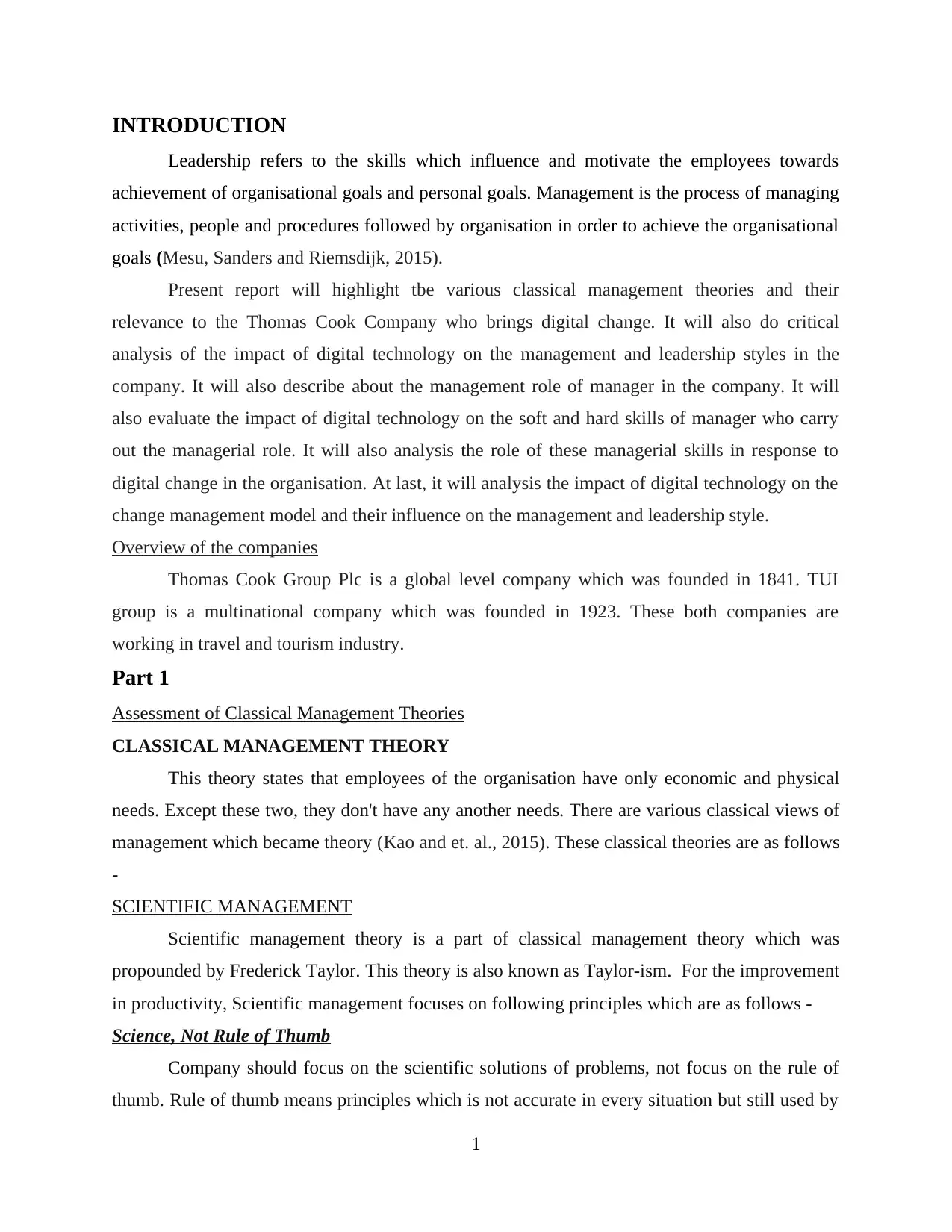
INTRODUCTION
Leadership refers to the skills which influence and motivate the employees towards
achievement of organisational goals and personal goals. Management is the process of managing
activities, people and procedures followed by organisation in order to achieve the organisational
goals (Mesu, Sanders and Riemsdijk, 2015).
Present report will highlight tbe various classical management theories and their
relevance to the Thomas Cook Company who brings digital change. It will also do critical
analysis of the impact of digital technology on the management and leadership styles in the
company. It will also describe about the management role of manager in the company. It will
also evaluate the impact of digital technology on the soft and hard skills of manager who carry
out the managerial role. It will also analysis the role of these managerial skills in response to
digital change in the organisation. At last, it will analysis the impact of digital technology on the
change management model and their influence on the management and leadership style.
Overview of the companies
Thomas Cook Group Plc is a global level company which was founded in 1841. TUI
group is a multinational company which was founded in 1923. These both companies are
working in travel and tourism industry.
Part 1
Assessment of Classical Management Theories
CLASSICAL MANAGEMENT THEORY
This theory states that employees of the organisation have only economic and physical
needs. Except these two, they don't have any another needs. There are various classical views of
management which became theory (Kao and et. al., 2015). These classical theories are as follows
-
SCIENTIFIC MANAGEMENT
Scientific management theory is a part of classical management theory which was
propounded by Frederick Taylor. This theory is also known as Taylor-ism. For the improvement
in productivity, Scientific management focuses on following principles which are as follows -
Science, Not Rule of Thumb
Company should focus on the scientific solutions of problems, not focus on the rule of
thumb. Rule of thumb means principles which is not accurate in every situation but still used by
1
Leadership refers to the skills which influence and motivate the employees towards
achievement of organisational goals and personal goals. Management is the process of managing
activities, people and procedures followed by organisation in order to achieve the organisational
goals (Mesu, Sanders and Riemsdijk, 2015).
Present report will highlight tbe various classical management theories and their
relevance to the Thomas Cook Company who brings digital change. It will also do critical
analysis of the impact of digital technology on the management and leadership styles in the
company. It will also describe about the management role of manager in the company. It will
also evaluate the impact of digital technology on the soft and hard skills of manager who carry
out the managerial role. It will also analysis the role of these managerial skills in response to
digital change in the organisation. At last, it will analysis the impact of digital technology on the
change management model and their influence on the management and leadership style.
Overview of the companies
Thomas Cook Group Plc is a global level company which was founded in 1841. TUI
group is a multinational company which was founded in 1923. These both companies are
working in travel and tourism industry.
Part 1
Assessment of Classical Management Theories
CLASSICAL MANAGEMENT THEORY
This theory states that employees of the organisation have only economic and physical
needs. Except these two, they don't have any another needs. There are various classical views of
management which became theory (Kao and et. al., 2015). These classical theories are as follows
-
SCIENTIFIC MANAGEMENT
Scientific management theory is a part of classical management theory which was
propounded by Frederick Taylor. This theory is also known as Taylor-ism. For the improvement
in productivity, Scientific management focuses on following principles which are as follows -
Science, Not Rule of Thumb
Company should focus on the scientific solutions of problems, not focus on the rule of
thumb. Rule of thumb means principles which is not accurate in every situation but still used by
1
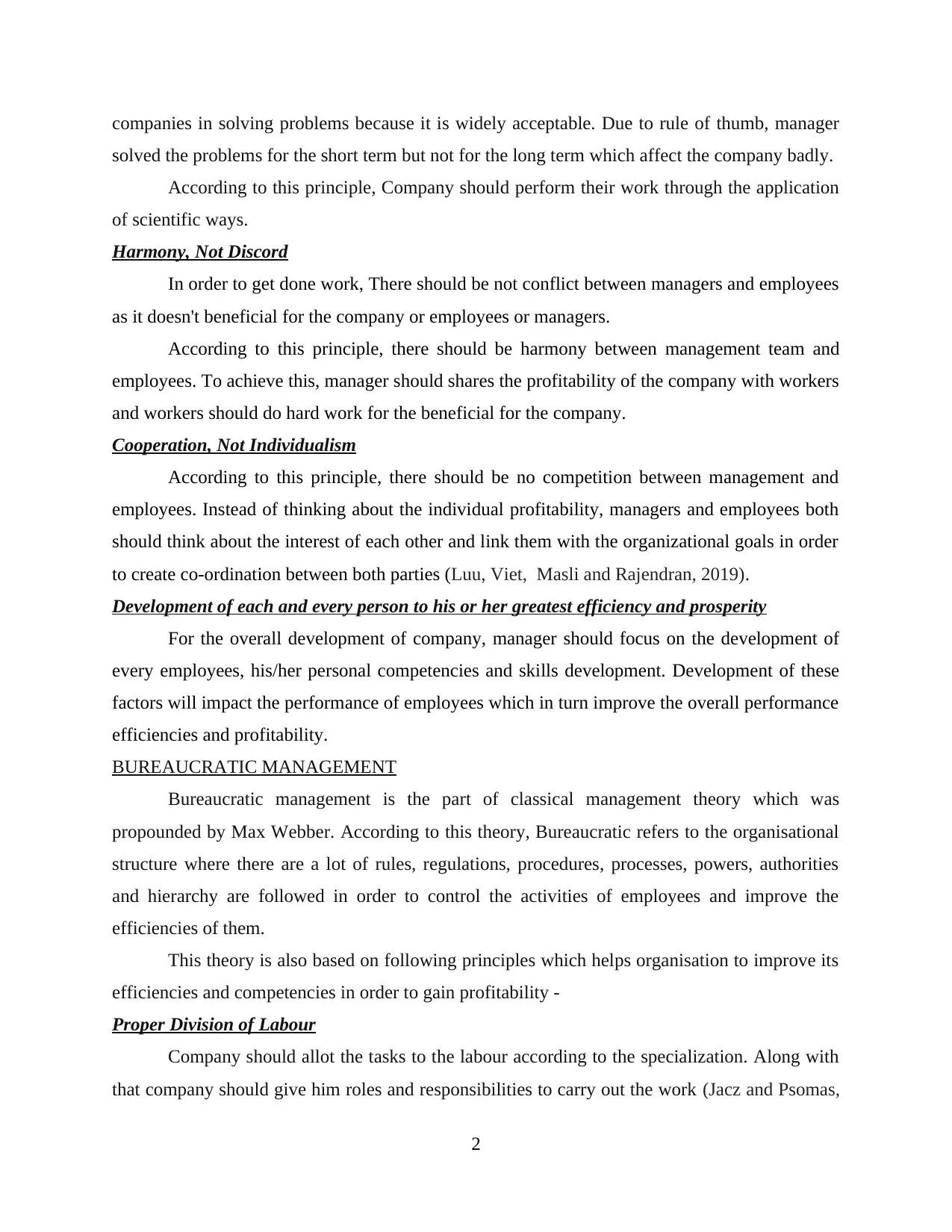
companies in solving problems because it is widely acceptable. Due to rule of thumb, manager
solved the problems for the short term but not for the long term which affect the company badly.
According to this principle, Company should perform their work through the application
of scientific ways.
Harmony, Not Discord
In order to get done work, There should be not conflict between managers and employees
as it doesn't beneficial for the company or employees or managers.
According to this principle, there should be harmony between management team and
employees. To achieve this, manager should shares the profitability of the company with workers
and workers should do hard work for the beneficial for the company.
Cooperation, Not Individualism
According to this principle, there should be no competition between management and
employees. Instead of thinking about the individual profitability, managers and employees both
should think about the interest of each other and link them with the organizational goals in order
to create co-ordination between both parties (Luu, Viet, Masli and Rajendran, 2019).
Development of each and every person to his or her greatest efficiency and prosperity
For the overall development of company, manager should focus on the development of
every employees, his/her personal competencies and skills development. Development of these
factors will impact the performance of employees which in turn improve the overall performance
efficiencies and profitability.
BUREAUCRATIC MANAGEMENT
Bureaucratic management is the part of classical management theory which was
propounded by Max Webber. According to this theory, Bureaucratic refers to the organisational
structure where there are a lot of rules, regulations, procedures, processes, powers, authorities
and hierarchy are followed in order to control the activities of employees and improve the
efficiencies of them.
This theory is also based on following principles which helps organisation to improve its
efficiencies and competencies in order to gain profitability -
Proper Division of Labour
Company should allot the tasks to the labour according to the specialization. Along with
that company should give him roles and responsibilities to carry out the work (Jacz and Psomas,
2
solved the problems for the short term but not for the long term which affect the company badly.
According to this principle, Company should perform their work through the application
of scientific ways.
Harmony, Not Discord
In order to get done work, There should be not conflict between managers and employees
as it doesn't beneficial for the company or employees or managers.
According to this principle, there should be harmony between management team and
employees. To achieve this, manager should shares the profitability of the company with workers
and workers should do hard work for the beneficial for the company.
Cooperation, Not Individualism
According to this principle, there should be no competition between management and
employees. Instead of thinking about the individual profitability, managers and employees both
should think about the interest of each other and link them with the organizational goals in order
to create co-ordination between both parties (Luu, Viet, Masli and Rajendran, 2019).
Development of each and every person to his or her greatest efficiency and prosperity
For the overall development of company, manager should focus on the development of
every employees, his/her personal competencies and skills development. Development of these
factors will impact the performance of employees which in turn improve the overall performance
efficiencies and profitability.
BUREAUCRATIC MANAGEMENT
Bureaucratic management is the part of classical management theory which was
propounded by Max Webber. According to this theory, Bureaucratic refers to the organisational
structure where there are a lot of rules, regulations, procedures, processes, powers, authorities
and hierarchy are followed in order to control the activities of employees and improve the
efficiencies of them.
This theory is also based on following principles which helps organisation to improve its
efficiencies and competencies in order to gain profitability -
Proper Division of Labour
Company should allot the tasks to the labour according to the specialization. Along with
that company should give him roles and responsibilities to carry out the work (Jacz and Psomas,
2
Secure Best Marks with AI Grader
Need help grading? Try our AI Grader for instant feedback on your assignments.
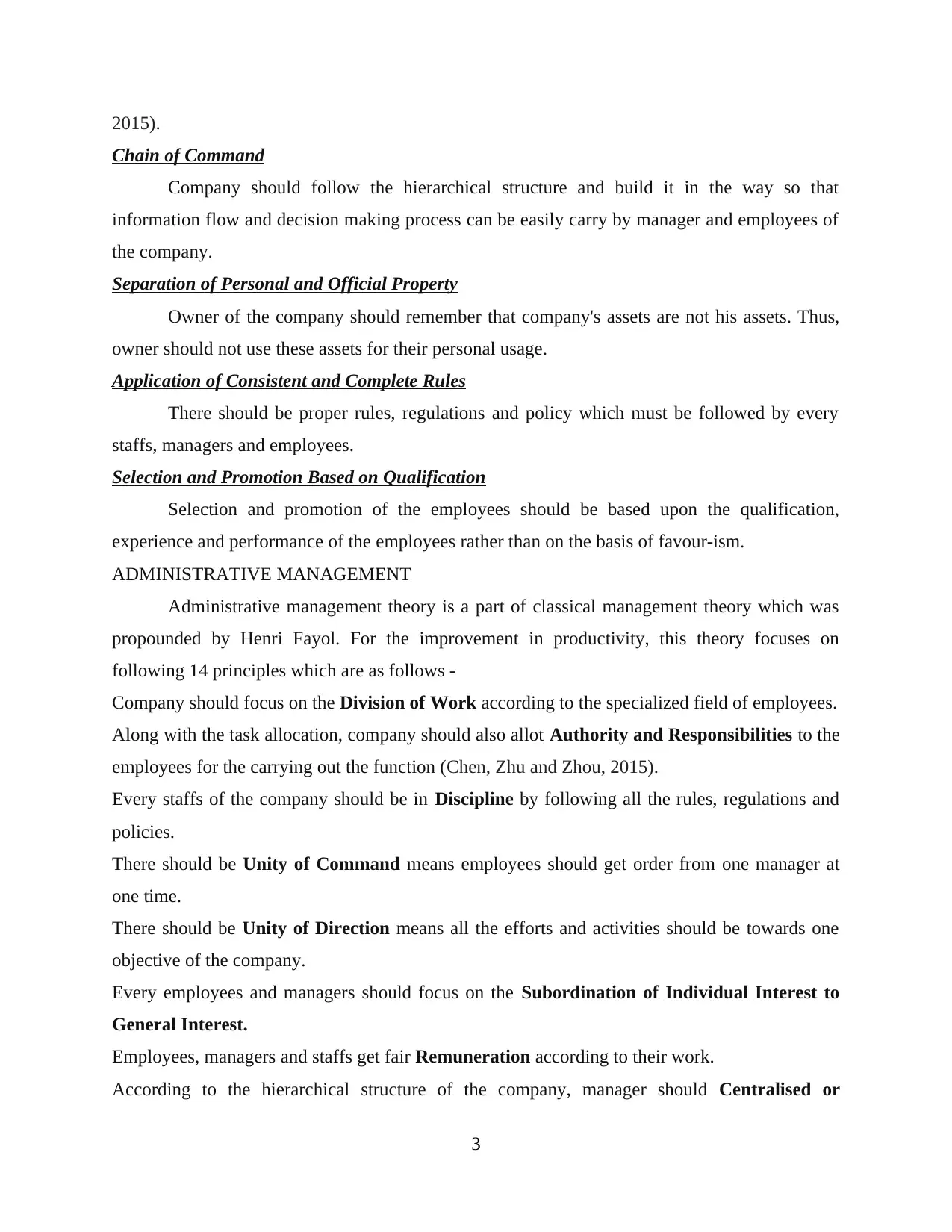
2015).
Chain of Command
Company should follow the hierarchical structure and build it in the way so that
information flow and decision making process can be easily carry by manager and employees of
the company.
Separation of Personal and Official Property
Owner of the company should remember that company's assets are not his assets. Thus,
owner should not use these assets for their personal usage.
Application of Consistent and Complete Rules
There should be proper rules, regulations and policy which must be followed by every
staffs, managers and employees.
Selection and Promotion Based on Qualification
Selection and promotion of the employees should be based upon the qualification,
experience and performance of the employees rather than on the basis of favour-ism.
ADMINISTRATIVE MANAGEMENT
Administrative management theory is a part of classical management theory which was
propounded by Henri Fayol. For the improvement in productivity, this theory focuses on
following 14 principles which are as follows -
Company should focus on the Division of Work according to the specialized field of employees.
Along with the task allocation, company should also allot Authority and Responsibilities to the
employees for the carrying out the function (Chen, Zhu and Zhou, 2015).
Every staffs of the company should be in Discipline by following all the rules, regulations and
policies.
There should be Unity of Command means employees should get order from one manager at
one time.
There should be Unity of Direction means all the efforts and activities should be towards one
objective of the company.
Every employees and managers should focus on the Subordination of Individual Interest to
General Interest.
Employees, managers and staffs get fair Remuneration according to their work.
According to the hierarchical structure of the company, manager should Centralised or
3
Chain of Command
Company should follow the hierarchical structure and build it in the way so that
information flow and decision making process can be easily carry by manager and employees of
the company.
Separation of Personal and Official Property
Owner of the company should remember that company's assets are not his assets. Thus,
owner should not use these assets for their personal usage.
Application of Consistent and Complete Rules
There should be proper rules, regulations and policy which must be followed by every
staffs, managers and employees.
Selection and Promotion Based on Qualification
Selection and promotion of the employees should be based upon the qualification,
experience and performance of the employees rather than on the basis of favour-ism.
ADMINISTRATIVE MANAGEMENT
Administrative management theory is a part of classical management theory which was
propounded by Henri Fayol. For the improvement in productivity, this theory focuses on
following 14 principles which are as follows -
Company should focus on the Division of Work according to the specialized field of employees.
Along with the task allocation, company should also allot Authority and Responsibilities to the
employees for the carrying out the function (Chen, Zhu and Zhou, 2015).
Every staffs of the company should be in Discipline by following all the rules, regulations and
policies.
There should be Unity of Command means employees should get order from one manager at
one time.
There should be Unity of Direction means all the efforts and activities should be towards one
objective of the company.
Every employees and managers should focus on the Subordination of Individual Interest to
General Interest.
Employees, managers and staffs get fair Remuneration according to their work.
According to the hierarchical structure of the company, manager should Centralised or
3
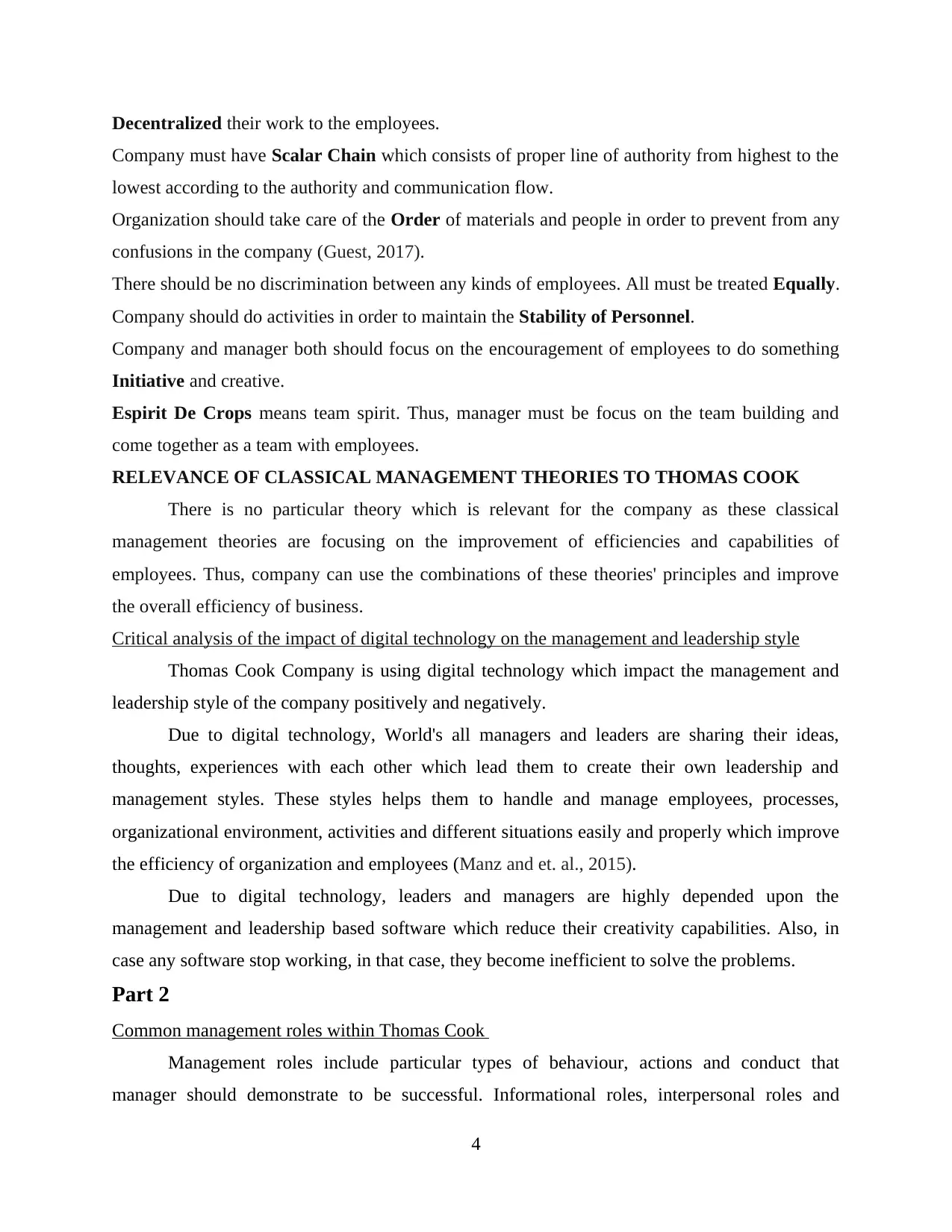
Decentralized their work to the employees.
Company must have Scalar Chain which consists of proper line of authority from highest to the
lowest according to the authority and communication flow.
Organization should take care of the Order of materials and people in order to prevent from any
confusions in the company (Guest, 2017).
There should be no discrimination between any kinds of employees. All must be treated Equally.
Company should do activities in order to maintain the Stability of Personnel.
Company and manager both should focus on the encouragement of employees to do something
Initiative and creative.
Espirit De Crops means team spirit. Thus, manager must be focus on the team building and
come together as a team with employees.
RELEVANCE OF CLASSICAL MANAGEMENT THEORIES TO THOMAS COOK
There is no particular theory which is relevant for the company as these classical
management theories are focusing on the improvement of efficiencies and capabilities of
employees. Thus, company can use the combinations of these theories' principles and improve
the overall efficiency of business.
Critical analysis of the impact of digital technology on the management and leadership style
Thomas Cook Company is using digital technology which impact the management and
leadership style of the company positively and negatively.
Due to digital technology, World's all managers and leaders are sharing their ideas,
thoughts, experiences with each other which lead them to create their own leadership and
management styles. These styles helps them to handle and manage employees, processes,
organizational environment, activities and different situations easily and properly which improve
the efficiency of organization and employees (Manz and et. al., 2015).
Due to digital technology, leaders and managers are highly depended upon the
management and leadership based software which reduce their creativity capabilities. Also, in
case any software stop working, in that case, they become inefficient to solve the problems.
Part 2
Common management roles within Thomas Cook
Management roles include particular types of behaviour, actions and conduct that
manager should demonstrate to be successful. Informational roles, interpersonal roles and
4
Company must have Scalar Chain which consists of proper line of authority from highest to the
lowest according to the authority and communication flow.
Organization should take care of the Order of materials and people in order to prevent from any
confusions in the company (Guest, 2017).
There should be no discrimination between any kinds of employees. All must be treated Equally.
Company should do activities in order to maintain the Stability of Personnel.
Company and manager both should focus on the encouragement of employees to do something
Initiative and creative.
Espirit De Crops means team spirit. Thus, manager must be focus on the team building and
come together as a team with employees.
RELEVANCE OF CLASSICAL MANAGEMENT THEORIES TO THOMAS COOK
There is no particular theory which is relevant for the company as these classical
management theories are focusing on the improvement of efficiencies and capabilities of
employees. Thus, company can use the combinations of these theories' principles and improve
the overall efficiency of business.
Critical analysis of the impact of digital technology on the management and leadership style
Thomas Cook Company is using digital technology which impact the management and
leadership style of the company positively and negatively.
Due to digital technology, World's all managers and leaders are sharing their ideas,
thoughts, experiences with each other which lead them to create their own leadership and
management styles. These styles helps them to handle and manage employees, processes,
organizational environment, activities and different situations easily and properly which improve
the efficiency of organization and employees (Manz and et. al., 2015).
Due to digital technology, leaders and managers are highly depended upon the
management and leadership based software which reduce their creativity capabilities. Also, in
case any software stop working, in that case, they become inefficient to solve the problems.
Part 2
Common management roles within Thomas Cook
Management roles include particular types of behaviour, actions and conduct that
manager should demonstrate to be successful. Informational roles, interpersonal roles and
4
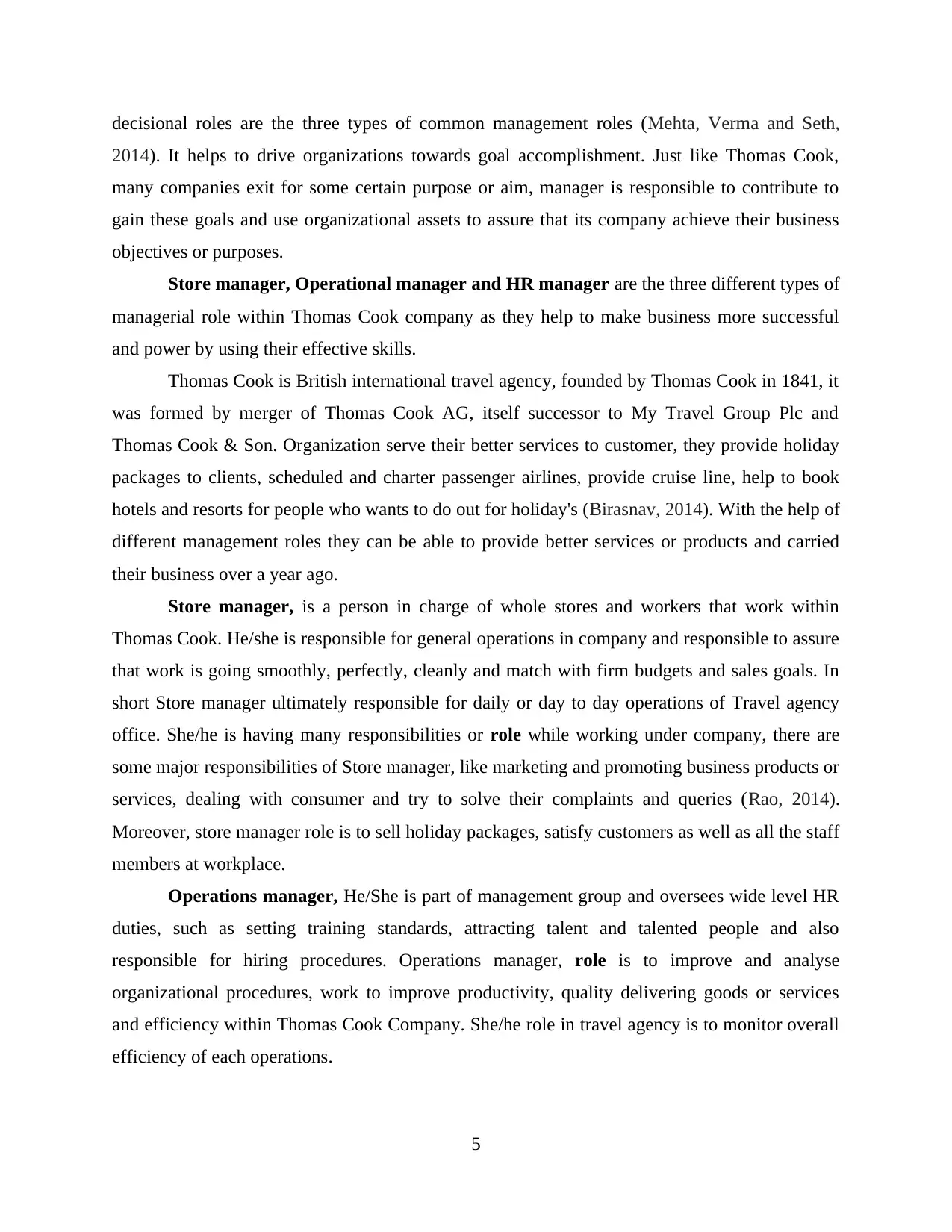
decisional roles are the three types of common management roles (Mehta, Verma and Seth,
2014). It helps to drive organizations towards goal accomplishment. Just like Thomas Cook,
many companies exit for some certain purpose or aim, manager is responsible to contribute to
gain these goals and use organizational assets to assure that its company achieve their business
objectives or purposes.
Store manager, Operational manager and HR manager are the three different types of
managerial role within Thomas Cook company as they help to make business more successful
and power by using their effective skills.
Thomas Cook is British international travel agency, founded by Thomas Cook in 1841, it
was formed by merger of Thomas Cook AG, itself successor to My Travel Group Plc and
Thomas Cook & Son. Organization serve their better services to customer, they provide holiday
packages to clients, scheduled and charter passenger airlines, provide cruise line, help to book
hotels and resorts for people who wants to do out for holiday's (Birasnav, 2014). With the help of
different management roles they can be able to provide better services or products and carried
their business over a year ago.
Store manager, is a person in charge of whole stores and workers that work within
Thomas Cook. He/she is responsible for general operations in company and responsible to assure
that work is going smoothly, perfectly, cleanly and match with firm budgets and sales goals. In
short Store manager ultimately responsible for daily or day to day operations of Travel agency
office. She/he is having many responsibilities or role while working under company, there are
some major responsibilities of Store manager, like marketing and promoting business products or
services, dealing with consumer and try to solve their complaints and queries (Rao, 2014).
Moreover, store manager role is to sell holiday packages, satisfy customers as well as all the staff
members at workplace.
Operations manager, He/She is part of management group and oversees wide level HR
duties, such as setting training standards, attracting talent and talented people and also
responsible for hiring procedures. Operations manager, role is to improve and analyse
organizational procedures, work to improve productivity, quality delivering goods or services
and efficiency within Thomas Cook Company. She/he role in travel agency is to monitor overall
efficiency of each operations.
5
2014). It helps to drive organizations towards goal accomplishment. Just like Thomas Cook,
many companies exit for some certain purpose or aim, manager is responsible to contribute to
gain these goals and use organizational assets to assure that its company achieve their business
objectives or purposes.
Store manager, Operational manager and HR manager are the three different types of
managerial role within Thomas Cook company as they help to make business more successful
and power by using their effective skills.
Thomas Cook is British international travel agency, founded by Thomas Cook in 1841, it
was formed by merger of Thomas Cook AG, itself successor to My Travel Group Plc and
Thomas Cook & Son. Organization serve their better services to customer, they provide holiday
packages to clients, scheduled and charter passenger airlines, provide cruise line, help to book
hotels and resorts for people who wants to do out for holiday's (Birasnav, 2014). With the help of
different management roles they can be able to provide better services or products and carried
their business over a year ago.
Store manager, is a person in charge of whole stores and workers that work within
Thomas Cook. He/she is responsible for general operations in company and responsible to assure
that work is going smoothly, perfectly, cleanly and match with firm budgets and sales goals. In
short Store manager ultimately responsible for daily or day to day operations of Travel agency
office. She/he is having many responsibilities or role while working under company, there are
some major responsibilities of Store manager, like marketing and promoting business products or
services, dealing with consumer and try to solve their complaints and queries (Rao, 2014).
Moreover, store manager role is to sell holiday packages, satisfy customers as well as all the staff
members at workplace.
Operations manager, He/She is part of management group and oversees wide level HR
duties, such as setting training standards, attracting talent and talented people and also
responsible for hiring procedures. Operations manager, role is to improve and analyse
organizational procedures, work to improve productivity, quality delivering goods or services
and efficiency within Thomas Cook Company. She/he role in travel agency is to monitor overall
efficiency of each operations.
5
Paraphrase This Document
Need a fresh take? Get an instant paraphrase of this document with our AI Paraphraser
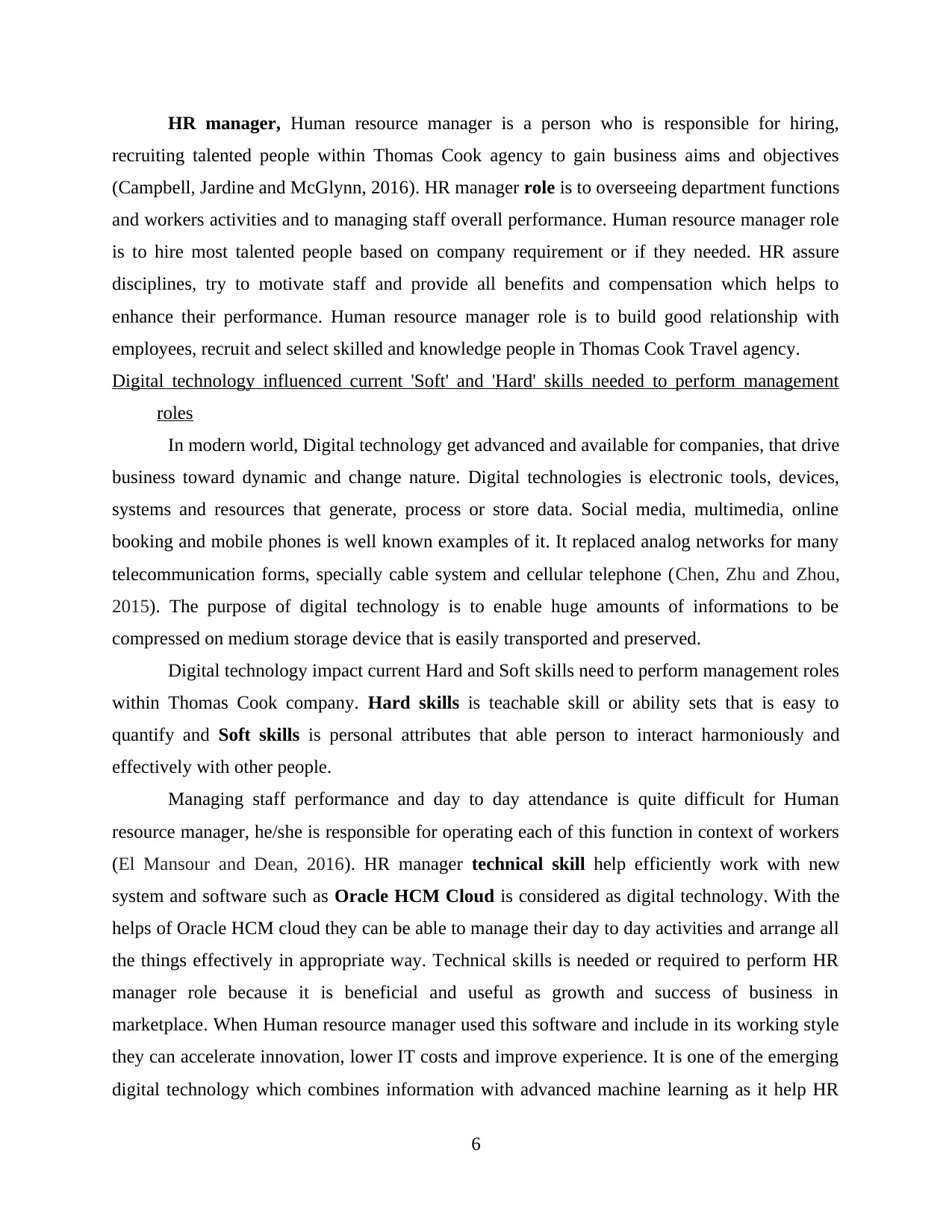
HR manager, Human resource manager is a person who is responsible for hiring,
recruiting talented people within Thomas Cook agency to gain business aims and objectives
(Campbell, Jardine and McGlynn, 2016). HR manager role is to overseeing department functions
and workers activities and to managing staff overall performance. Human resource manager role
is to hire most talented people based on company requirement or if they needed. HR assure
disciplines, try to motivate staff and provide all benefits and compensation which helps to
enhance their performance. Human resource manager role is to build good relationship with
employees, recruit and select skilled and knowledge people in Thomas Cook Travel agency.
Digital technology influenced current 'Soft' and 'Hard' skills needed to perform management
roles
In modern world, Digital technology get advanced and available for companies, that drive
business toward dynamic and change nature. Digital technologies is electronic tools, devices,
systems and resources that generate, process or store data. Social media, multimedia, online
booking and mobile phones is well known examples of it. It replaced analog networks for many
telecommunication forms, specially cable system and cellular telephone (Chen, Zhu and Zhou,
2015). The purpose of digital technology is to enable huge amounts of informations to be
compressed on medium storage device that is easily transported and preserved.
Digital technology impact current Hard and Soft skills need to perform management roles
within Thomas Cook company. Hard skills is teachable skill or ability sets that is easy to
quantify and Soft skills is personal attributes that able person to interact harmoniously and
effectively with other people.
Managing staff performance and day to day attendance is quite difficult for Human
resource manager, he/she is responsible for operating each of this function in context of workers
(El Mansour and Dean, 2016). HR manager technical skill help efficiently work with new
system and software such as Oracle HCM Cloud is considered as digital technology. With the
helps of Oracle HCM cloud they can be able to manage their day to day activities and arrange all
the things effectively in appropriate way. Technical skills is needed or required to perform HR
manager role because it is beneficial and useful as growth and success of business in
marketplace. When Human resource manager used this software and include in its working style
they can accelerate innovation, lower IT costs and improve experience. It is one of the emerging
digital technology which combines information with advanced machine learning as it help HR
6
recruiting talented people within Thomas Cook agency to gain business aims and objectives
(Campbell, Jardine and McGlynn, 2016). HR manager role is to overseeing department functions
and workers activities and to managing staff overall performance. Human resource manager role
is to hire most talented people based on company requirement or if they needed. HR assure
disciplines, try to motivate staff and provide all benefits and compensation which helps to
enhance their performance. Human resource manager role is to build good relationship with
employees, recruit and select skilled and knowledge people in Thomas Cook Travel agency.
Digital technology influenced current 'Soft' and 'Hard' skills needed to perform management
roles
In modern world, Digital technology get advanced and available for companies, that drive
business toward dynamic and change nature. Digital technologies is electronic tools, devices,
systems and resources that generate, process or store data. Social media, multimedia, online
booking and mobile phones is well known examples of it. It replaced analog networks for many
telecommunication forms, specially cable system and cellular telephone (Chen, Zhu and Zhou,
2015). The purpose of digital technology is to enable huge amounts of informations to be
compressed on medium storage device that is easily transported and preserved.
Digital technology impact current Hard and Soft skills need to perform management roles
within Thomas Cook company. Hard skills is teachable skill or ability sets that is easy to
quantify and Soft skills is personal attributes that able person to interact harmoniously and
effectively with other people.
Managing staff performance and day to day attendance is quite difficult for Human
resource manager, he/she is responsible for operating each of this function in context of workers
(El Mansour and Dean, 2016). HR manager technical skill help efficiently work with new
system and software such as Oracle HCM Cloud is considered as digital technology. With the
helps of Oracle HCM cloud they can be able to manage their day to day activities and arrange all
the things effectively in appropriate way. Technical skills is needed or required to perform HR
manager role because it is beneficial and useful as growth and success of business in
marketplace. When Human resource manager used this software and include in its working style
they can accelerate innovation, lower IT costs and improve experience. It is one of the emerging
digital technology which combines information with advanced machine learning as it help HR
6
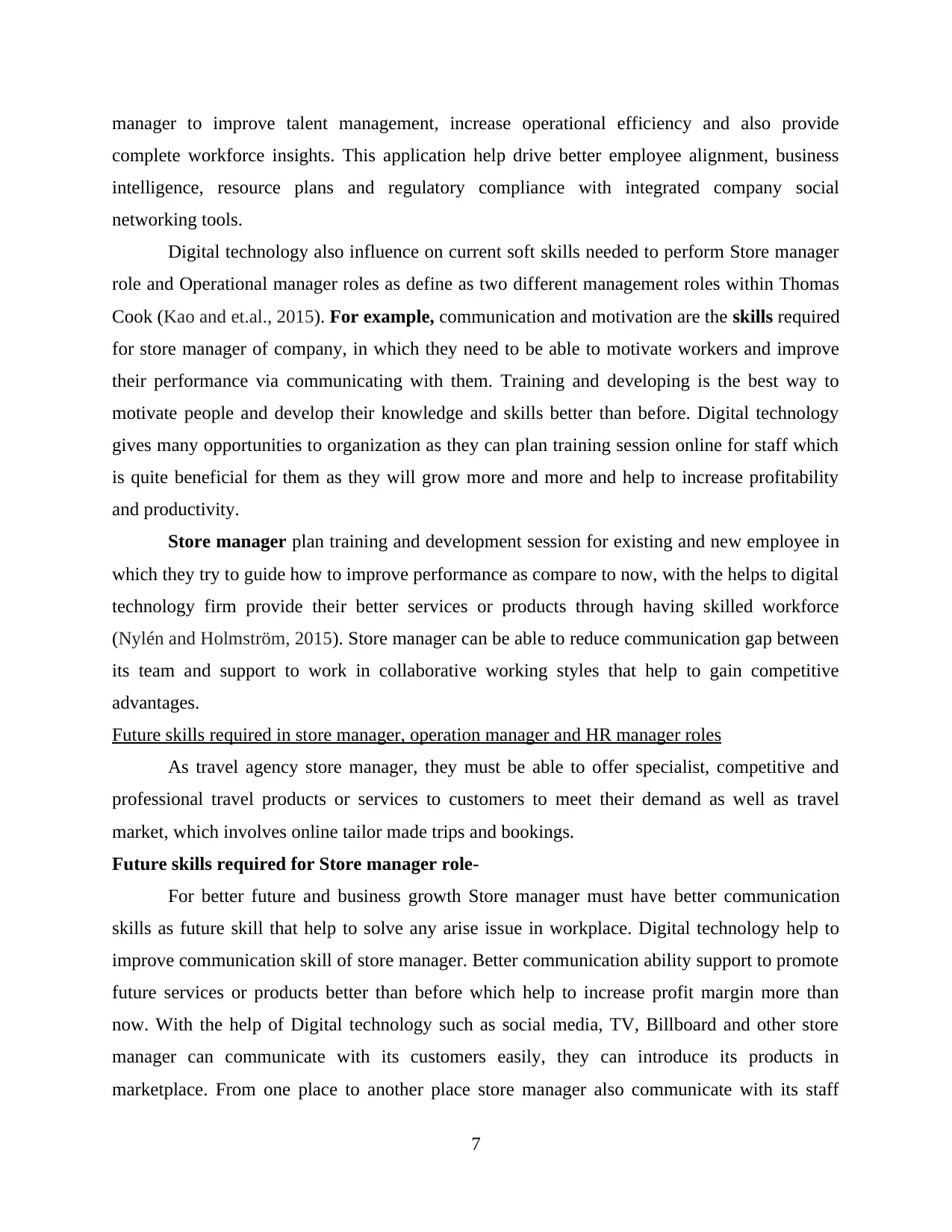
manager to improve talent management, increase operational efficiency and also provide
complete workforce insights. This application help drive better employee alignment, business
intelligence, resource plans and regulatory compliance with integrated company social
networking tools.
Digital technology also influence on current soft skills needed to perform Store manager
role and Operational manager roles as define as two different management roles within Thomas
Cook (Kao and et.al., 2015). For example, communication and motivation are the skills required
for store manager of company, in which they need to be able to motivate workers and improve
their performance via communicating with them. Training and developing is the best way to
motivate people and develop their knowledge and skills better than before. Digital technology
gives many opportunities to organization as they can plan training session online for staff which
is quite beneficial for them as they will grow more and more and help to increase profitability
and productivity.
Store manager plan training and development session for existing and new employee in
which they try to guide how to improve performance as compare to now, with the helps to digital
technology firm provide their better services or products through having skilled workforce
(Nylén and Holmström, 2015). Store manager can be able to reduce communication gap between
its team and support to work in collaborative working styles that help to gain competitive
advantages.
Future skills required in store manager, operation manager and HR manager roles
As travel agency store manager, they must be able to offer specialist, competitive and
professional travel products or services to customers to meet their demand as well as travel
market, which involves online tailor made trips and bookings.
Future skills required for Store manager role-
For better future and business growth Store manager must have better communication
skills as future skill that help to solve any arise issue in workplace. Digital technology help to
improve communication skill of store manager. Better communication ability support to promote
future services or products better than before which help to increase profit margin more than
now. With the help of Digital technology such as social media, TV, Billboard and other store
manager can communicate with its customers easily, they can introduce its products in
marketplace. From one place to another place store manager also communicate with its staff
7
complete workforce insights. This application help drive better employee alignment, business
intelligence, resource plans and regulatory compliance with integrated company social
networking tools.
Digital technology also influence on current soft skills needed to perform Store manager
role and Operational manager roles as define as two different management roles within Thomas
Cook (Kao and et.al., 2015). For example, communication and motivation are the skills required
for store manager of company, in which they need to be able to motivate workers and improve
their performance via communicating with them. Training and developing is the best way to
motivate people and develop their knowledge and skills better than before. Digital technology
gives many opportunities to organization as they can plan training session online for staff which
is quite beneficial for them as they will grow more and more and help to increase profitability
and productivity.
Store manager plan training and development session for existing and new employee in
which they try to guide how to improve performance as compare to now, with the helps to digital
technology firm provide their better services or products through having skilled workforce
(Nylén and Holmström, 2015). Store manager can be able to reduce communication gap between
its team and support to work in collaborative working styles that help to gain competitive
advantages.
Future skills required in store manager, operation manager and HR manager roles
As travel agency store manager, they must be able to offer specialist, competitive and
professional travel products or services to customers to meet their demand as well as travel
market, which involves online tailor made trips and bookings.
Future skills required for Store manager role-
For better future and business growth Store manager must have better communication
skills as future skill that help to solve any arise issue in workplace. Digital technology help to
improve communication skill of store manager. Better communication ability support to promote
future services or products better than before which help to increase profit margin more than
now. With the help of Digital technology such as social media, TV, Billboard and other store
manager can communicate with its customers easily, they can introduce its products in
marketplace. From one place to another place store manager also communicate with its staff
7
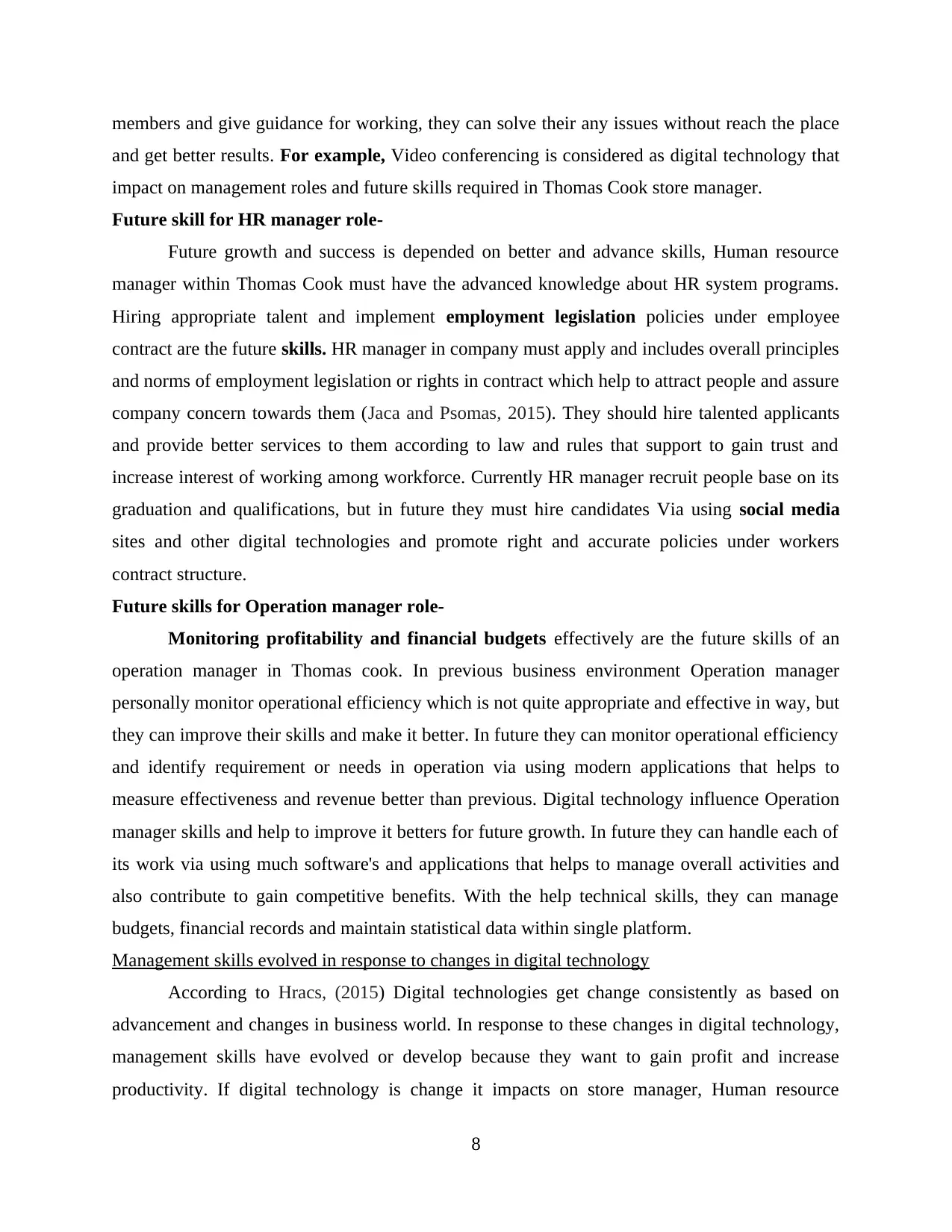
members and give guidance for working, they can solve their any issues without reach the place
and get better results. For example, Video conferencing is considered as digital technology that
impact on management roles and future skills required in Thomas Cook store manager.
Future skill for HR manager role-
Future growth and success is depended on better and advance skills, Human resource
manager within Thomas Cook must have the advanced knowledge about HR system programs.
Hiring appropriate talent and implement employment legislation policies under employee
contract are the future skills. HR manager in company must apply and includes overall principles
and norms of employment legislation or rights in contract which help to attract people and assure
company concern towards them (Jaca and Psomas, 2015). They should hire talented applicants
and provide better services to them according to law and rules that support to gain trust and
increase interest of working among workforce. Currently HR manager recruit people base on its
graduation and qualifications, but in future they must hire candidates Via using social media
sites and other digital technologies and promote right and accurate policies under workers
contract structure.
Future skills for Operation manager role-
Monitoring profitability and financial budgets effectively are the future skills of an
operation manager in Thomas cook. In previous business environment Operation manager
personally monitor operational efficiency which is not quite appropriate and effective in way, but
they can improve their skills and make it better. In future they can monitor operational efficiency
and identify requirement or needs in operation via using modern applications that helps to
measure effectiveness and revenue better than previous. Digital technology influence Operation
manager skills and help to improve it betters for future growth. In future they can handle each of
its work via using much software's and applications that helps to manage overall activities and
also contribute to gain competitive benefits. With the help technical skills, they can manage
budgets, financial records and maintain statistical data within single platform.
Management skills evolved in response to changes in digital technology
According to Hracs, (2015) Digital technologies get change consistently as based on
advancement and changes in business world. In response to these changes in digital technology,
management skills have evolved or develop because they want to gain profit and increase
productivity. If digital technology is change it impacts on store manager, Human resource
8
and get better results. For example, Video conferencing is considered as digital technology that
impact on management roles and future skills required in Thomas Cook store manager.
Future skill for HR manager role-
Future growth and success is depended on better and advance skills, Human resource
manager within Thomas Cook must have the advanced knowledge about HR system programs.
Hiring appropriate talent and implement employment legislation policies under employee
contract are the future skills. HR manager in company must apply and includes overall principles
and norms of employment legislation or rights in contract which help to attract people and assure
company concern towards them (Jaca and Psomas, 2015). They should hire talented applicants
and provide better services to them according to law and rules that support to gain trust and
increase interest of working among workforce. Currently HR manager recruit people base on its
graduation and qualifications, but in future they must hire candidates Via using social media
sites and other digital technologies and promote right and accurate policies under workers
contract structure.
Future skills for Operation manager role-
Monitoring profitability and financial budgets effectively are the future skills of an
operation manager in Thomas cook. In previous business environment Operation manager
personally monitor operational efficiency which is not quite appropriate and effective in way, but
they can improve their skills and make it better. In future they can monitor operational efficiency
and identify requirement or needs in operation via using modern applications that helps to
measure effectiveness and revenue better than previous. Digital technology influence Operation
manager skills and help to improve it betters for future growth. In future they can handle each of
its work via using much software's and applications that helps to manage overall activities and
also contribute to gain competitive benefits. With the help technical skills, they can manage
budgets, financial records and maintain statistical data within single platform.
Management skills evolved in response to changes in digital technology
According to Hracs, (2015) Digital technologies get change consistently as based on
advancement and changes in business world. In response to these changes in digital technology,
management skills have evolved or develop because they want to gain profit and increase
productivity. If digital technology is change it impacts on store manager, Human resource
8
Secure Best Marks with AI Grader
Need help grading? Try our AI Grader for instant feedback on your assignments.
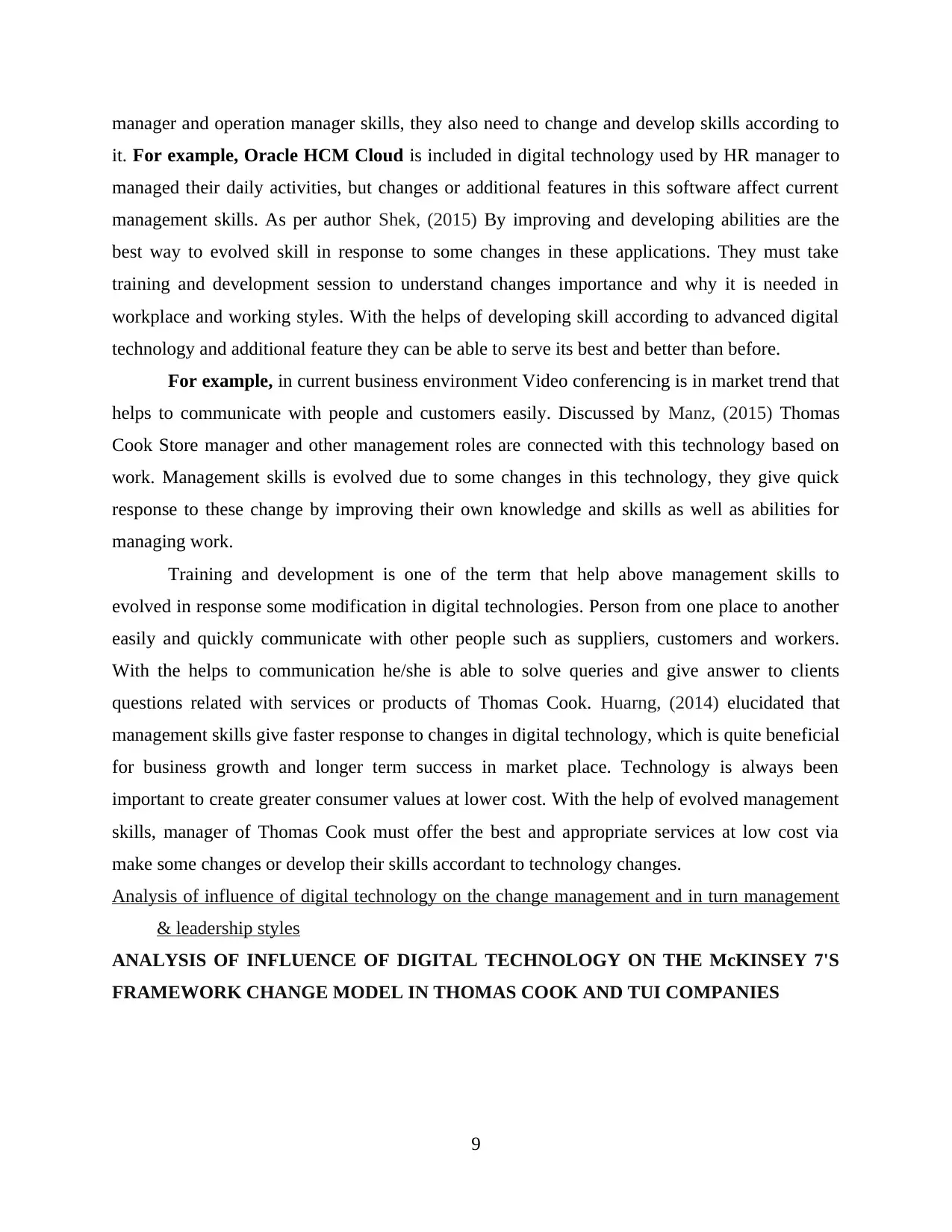
manager and operation manager skills, they also need to change and develop skills according to
it. For example, Oracle HCM Cloud is included in digital technology used by HR manager to
managed their daily activities, but changes or additional features in this software affect current
management skills. As per author Shek, (2015) By improving and developing abilities are the
best way to evolved skill in response to some changes in these applications. They must take
training and development session to understand changes importance and why it is needed in
workplace and working styles. With the helps of developing skill according to advanced digital
technology and additional feature they can be able to serve its best and better than before.
For example, in current business environment Video conferencing is in market trend that
helps to communicate with people and customers easily. Discussed by Manz, (2015) Thomas
Cook Store manager and other management roles are connected with this technology based on
work. Management skills is evolved due to some changes in this technology, they give quick
response to these change by improving their own knowledge and skills as well as abilities for
managing work.
Training and development is one of the term that help above management skills to
evolved in response some modification in digital technologies. Person from one place to another
easily and quickly communicate with other people such as suppliers, customers and workers.
With the helps to communication he/she is able to solve queries and give answer to clients
questions related with services or products of Thomas Cook. Huarng, (2014) elucidated that
management skills give faster response to changes in digital technology, which is quite beneficial
for business growth and longer term success in market place. Technology is always been
important to create greater consumer values at lower cost. With the help of evolved management
skills, manager of Thomas Cook must offer the best and appropriate services at low cost via
make some changes or develop their skills accordant to technology changes.
Analysis of influence of digital technology on the change management and in turn management
& leadership styles
ANALYSIS OF INFLUENCE OF DIGITAL TECHNOLOGY ON THE McKINSEY 7'S
FRAMEWORK CHANGE MODEL IN THOMAS COOK AND TUI COMPANIES
9
it. For example, Oracle HCM Cloud is included in digital technology used by HR manager to
managed their daily activities, but changes or additional features in this software affect current
management skills. As per author Shek, (2015) By improving and developing abilities are the
best way to evolved skill in response to some changes in these applications. They must take
training and development session to understand changes importance and why it is needed in
workplace and working styles. With the helps of developing skill according to advanced digital
technology and additional feature they can be able to serve its best and better than before.
For example, in current business environment Video conferencing is in market trend that
helps to communicate with people and customers easily. Discussed by Manz, (2015) Thomas
Cook Store manager and other management roles are connected with this technology based on
work. Management skills is evolved due to some changes in this technology, they give quick
response to these change by improving their own knowledge and skills as well as abilities for
managing work.
Training and development is one of the term that help above management skills to
evolved in response some modification in digital technologies. Person from one place to another
easily and quickly communicate with other people such as suppliers, customers and workers.
With the helps to communication he/she is able to solve queries and give answer to clients
questions related with services or products of Thomas Cook. Huarng, (2014) elucidated that
management skills give faster response to changes in digital technology, which is quite beneficial
for business growth and longer term success in market place. Technology is always been
important to create greater consumer values at lower cost. With the help of evolved management
skills, manager of Thomas Cook must offer the best and appropriate services at low cost via
make some changes or develop their skills accordant to technology changes.
Analysis of influence of digital technology on the change management and in turn management
& leadership styles
ANALYSIS OF INFLUENCE OF DIGITAL TECHNOLOGY ON THE McKINSEY 7'S
FRAMEWORK CHANGE MODEL IN THOMAS COOK AND TUI COMPANIES
9
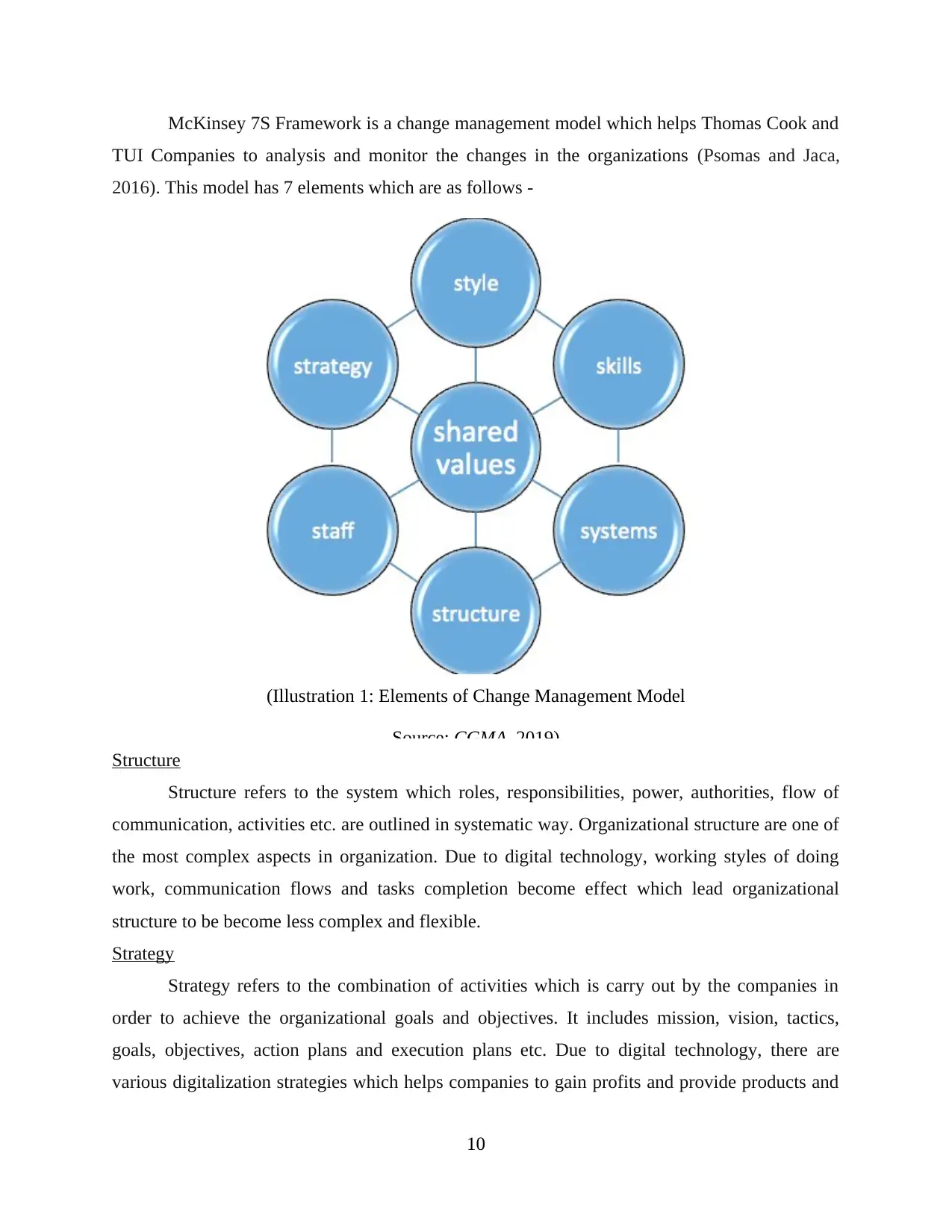
McKinsey 7S Framework is a change management model which helps Thomas Cook and
TUI Companies to analysis and monitor the changes in the organizations (Psomas and Jaca,
2016). This model has 7 elements which are as follows -
Structure
Structure refers to the system which roles, responsibilities, power, authorities, flow of
communication, activities etc. are outlined in systematic way. Organizational structure are one of
the most complex aspects in organization. Due to digital technology, working styles of doing
work, communication flows and tasks completion become effect which lead organizational
structure to be become less complex and flexible.
Strategy
Strategy refers to the combination of activities which is carry out by the companies in
order to achieve the organizational goals and objectives. It includes mission, vision, tactics,
goals, objectives, action plans and execution plans etc. Due to digital technology, there are
various digitalization strategies which helps companies to gain profits and provide products and
10
(Illustration 1: Elements of Change Management Model
Source: CGMA, 2019)
TUI Companies to analysis and monitor the changes in the organizations (Psomas and Jaca,
2016). This model has 7 elements which are as follows -
Structure
Structure refers to the system which roles, responsibilities, power, authorities, flow of
communication, activities etc. are outlined in systematic way. Organizational structure are one of
the most complex aspects in organization. Due to digital technology, working styles of doing
work, communication flows and tasks completion become effect which lead organizational
structure to be become less complex and flexible.
Strategy
Strategy refers to the combination of activities which is carry out by the companies in
order to achieve the organizational goals and objectives. It includes mission, vision, tactics,
goals, objectives, action plans and execution plans etc. Due to digital technology, there are
various digitalization strategies which helps companies to gain profits and provide products and
10
(Illustration 1: Elements of Change Management Model
Source: CGMA, 2019)
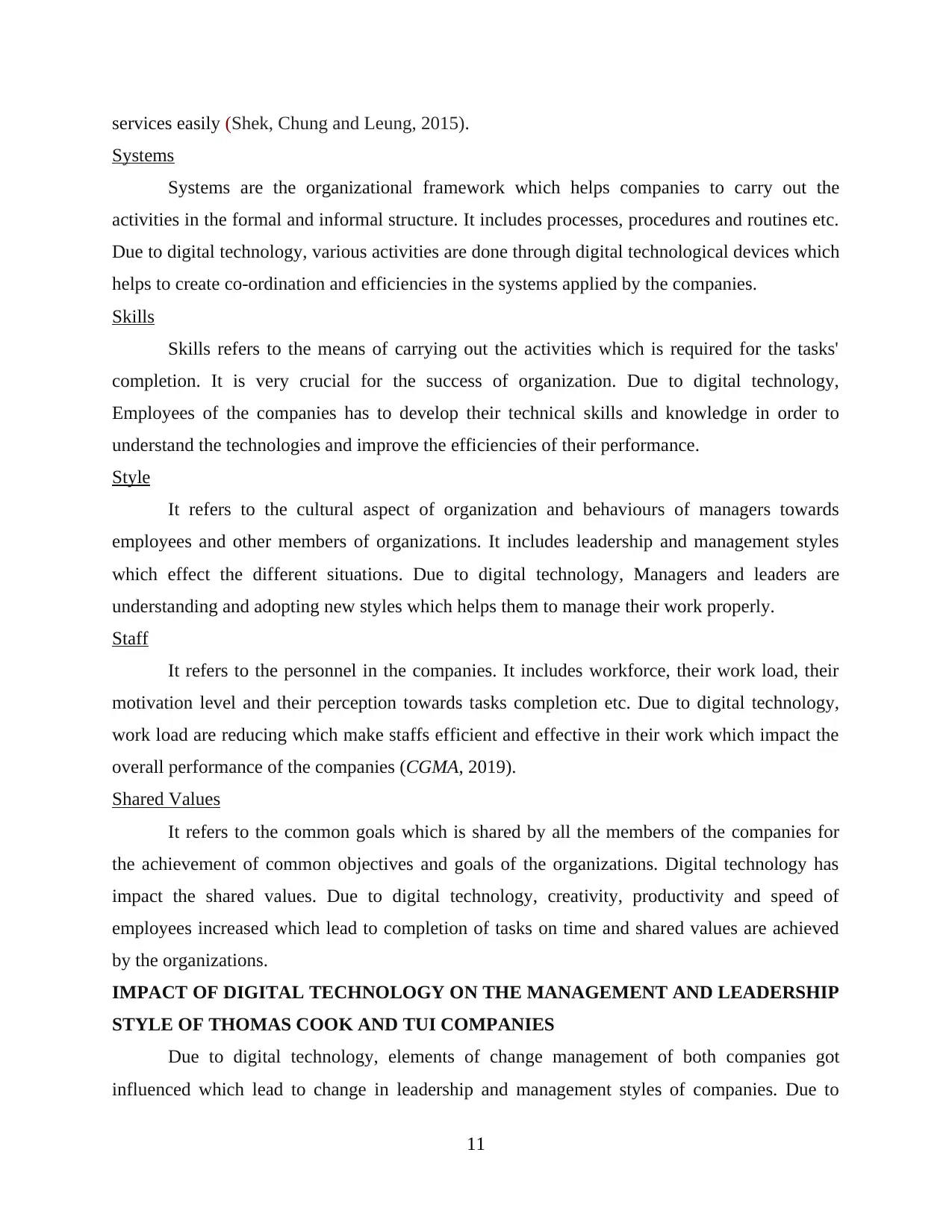
services easily (Shek, Chung and Leung, 2015).
Systems
Systems are the organizational framework which helps companies to carry out the
activities in the formal and informal structure. It includes processes, procedures and routines etc.
Due to digital technology, various activities are done through digital technological devices which
helps to create co-ordination and efficiencies in the systems applied by the companies.
Skills
Skills refers to the means of carrying out the activities which is required for the tasks'
completion. It is very crucial for the success of organization. Due to digital technology,
Employees of the companies has to develop their technical skills and knowledge in order to
understand the technologies and improve the efficiencies of their performance.
Style
It refers to the cultural aspect of organization and behaviours of managers towards
employees and other members of organizations. It includes leadership and management styles
which effect the different situations. Due to digital technology, Managers and leaders are
understanding and adopting new styles which helps them to manage their work properly.
Staff
It refers to the personnel in the companies. It includes workforce, their work load, their
motivation level and their perception towards tasks completion etc. Due to digital technology,
work load are reducing which make staffs efficient and effective in their work which impact the
overall performance of the companies (CGMA, 2019).
Shared Values
It refers to the common goals which is shared by all the members of the companies for
the achievement of common objectives and goals of the organizations. Digital technology has
impact the shared values. Due to digital technology, creativity, productivity and speed of
employees increased which lead to completion of tasks on time and shared values are achieved
by the organizations.
IMPACT OF DIGITAL TECHNOLOGY ON THE MANAGEMENT AND LEADERSHIP
STYLE OF THOMAS COOK AND TUI COMPANIES
Due to digital technology, elements of change management of both companies got
influenced which lead to change in leadership and management styles of companies. Due to
11
Systems
Systems are the organizational framework which helps companies to carry out the
activities in the formal and informal structure. It includes processes, procedures and routines etc.
Due to digital technology, various activities are done through digital technological devices which
helps to create co-ordination and efficiencies in the systems applied by the companies.
Skills
Skills refers to the means of carrying out the activities which is required for the tasks'
completion. It is very crucial for the success of organization. Due to digital technology,
Employees of the companies has to develop their technical skills and knowledge in order to
understand the technologies and improve the efficiencies of their performance.
Style
It refers to the cultural aspect of organization and behaviours of managers towards
employees and other members of organizations. It includes leadership and management styles
which effect the different situations. Due to digital technology, Managers and leaders are
understanding and adopting new styles which helps them to manage their work properly.
Staff
It refers to the personnel in the companies. It includes workforce, their work load, their
motivation level and their perception towards tasks completion etc. Due to digital technology,
work load are reducing which make staffs efficient and effective in their work which impact the
overall performance of the companies (CGMA, 2019).
Shared Values
It refers to the common goals which is shared by all the members of the companies for
the achievement of common objectives and goals of the organizations. Digital technology has
impact the shared values. Due to digital technology, creativity, productivity and speed of
employees increased which lead to completion of tasks on time and shared values are achieved
by the organizations.
IMPACT OF DIGITAL TECHNOLOGY ON THE MANAGEMENT AND LEADERSHIP
STYLE OF THOMAS COOK AND TUI COMPANIES
Due to digital technology, elements of change management of both companies got
influenced which lead to change in leadership and management styles of companies. Due to
11
Paraphrase This Document
Need a fresh take? Get an instant paraphrase of this document with our AI Paraphraser
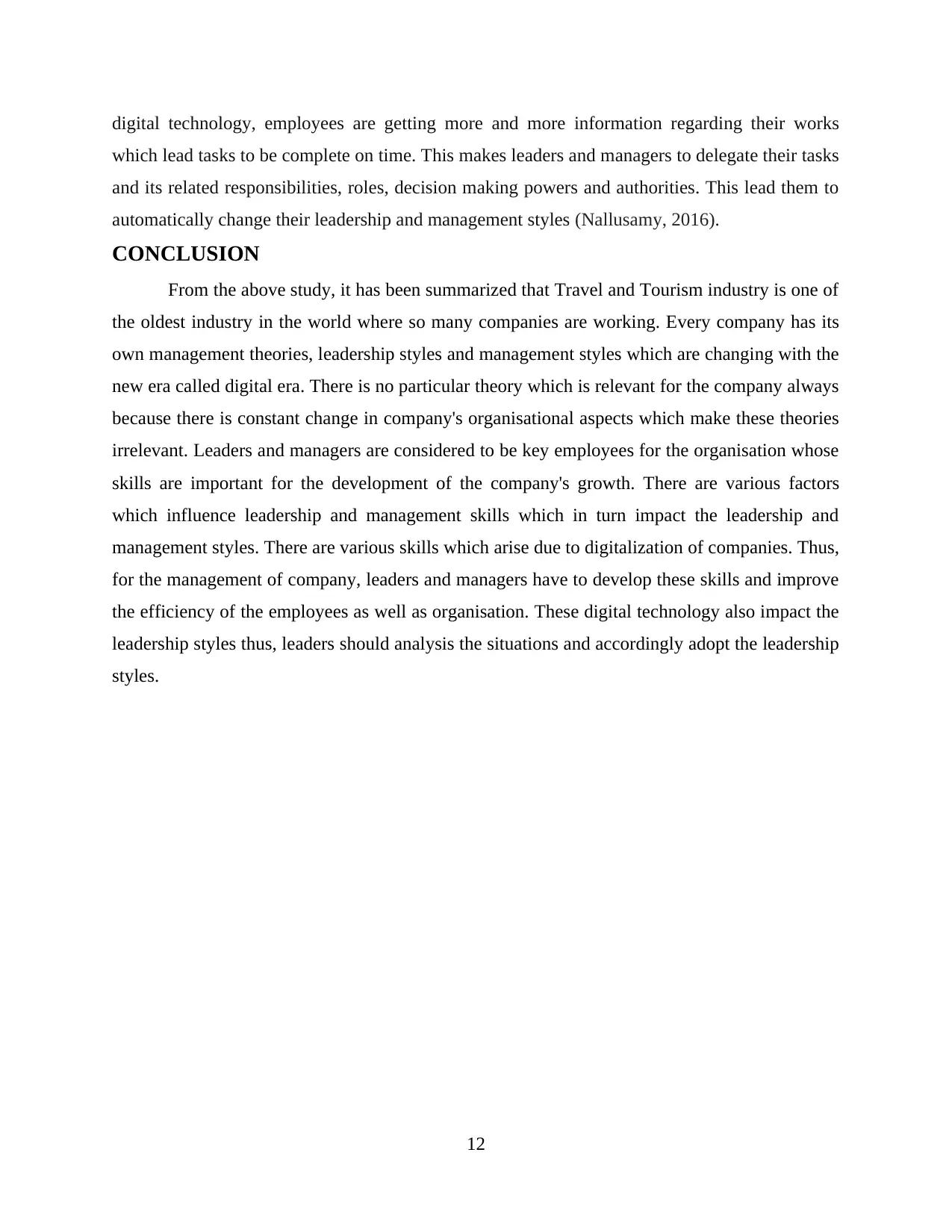
digital technology, employees are getting more and more information regarding their works
which lead tasks to be complete on time. This makes leaders and managers to delegate their tasks
and its related responsibilities, roles, decision making powers and authorities. This lead them to
automatically change their leadership and management styles (Nallusamy, 2016).
CONCLUSION
From the above study, it has been summarized that Travel and Tourism industry is one of
the oldest industry in the world where so many companies are working. Every company has its
own management theories, leadership styles and management styles which are changing with the
new era called digital era. There is no particular theory which is relevant for the company always
because there is constant change in company's organisational aspects which make these theories
irrelevant. Leaders and managers are considered to be key employees for the organisation whose
skills are important for the development of the company's growth. There are various factors
which influence leadership and management skills which in turn impact the leadership and
management styles. There are various skills which arise due to digitalization of companies. Thus,
for the management of company, leaders and managers have to develop these skills and improve
the efficiency of the employees as well as organisation. These digital technology also impact the
leadership styles thus, leaders should analysis the situations and accordingly adopt the leadership
styles.
12
which lead tasks to be complete on time. This makes leaders and managers to delegate their tasks
and its related responsibilities, roles, decision making powers and authorities. This lead them to
automatically change their leadership and management styles (Nallusamy, 2016).
CONCLUSION
From the above study, it has been summarized that Travel and Tourism industry is one of
the oldest industry in the world where so many companies are working. Every company has its
own management theories, leadership styles and management styles which are changing with the
new era called digital era. There is no particular theory which is relevant for the company always
because there is constant change in company's organisational aspects which make these theories
irrelevant. Leaders and managers are considered to be key employees for the organisation whose
skills are important for the development of the company's growth. There are various factors
which influence leadership and management skills which in turn impact the leadership and
management styles. There are various skills which arise due to digitalization of companies. Thus,
for the management of company, leaders and managers have to develop these skills and improve
the efficiency of the employees as well as organisation. These digital technology also impact the
leadership styles thus, leaders should analysis the situations and accordingly adopt the leadership
styles.
12
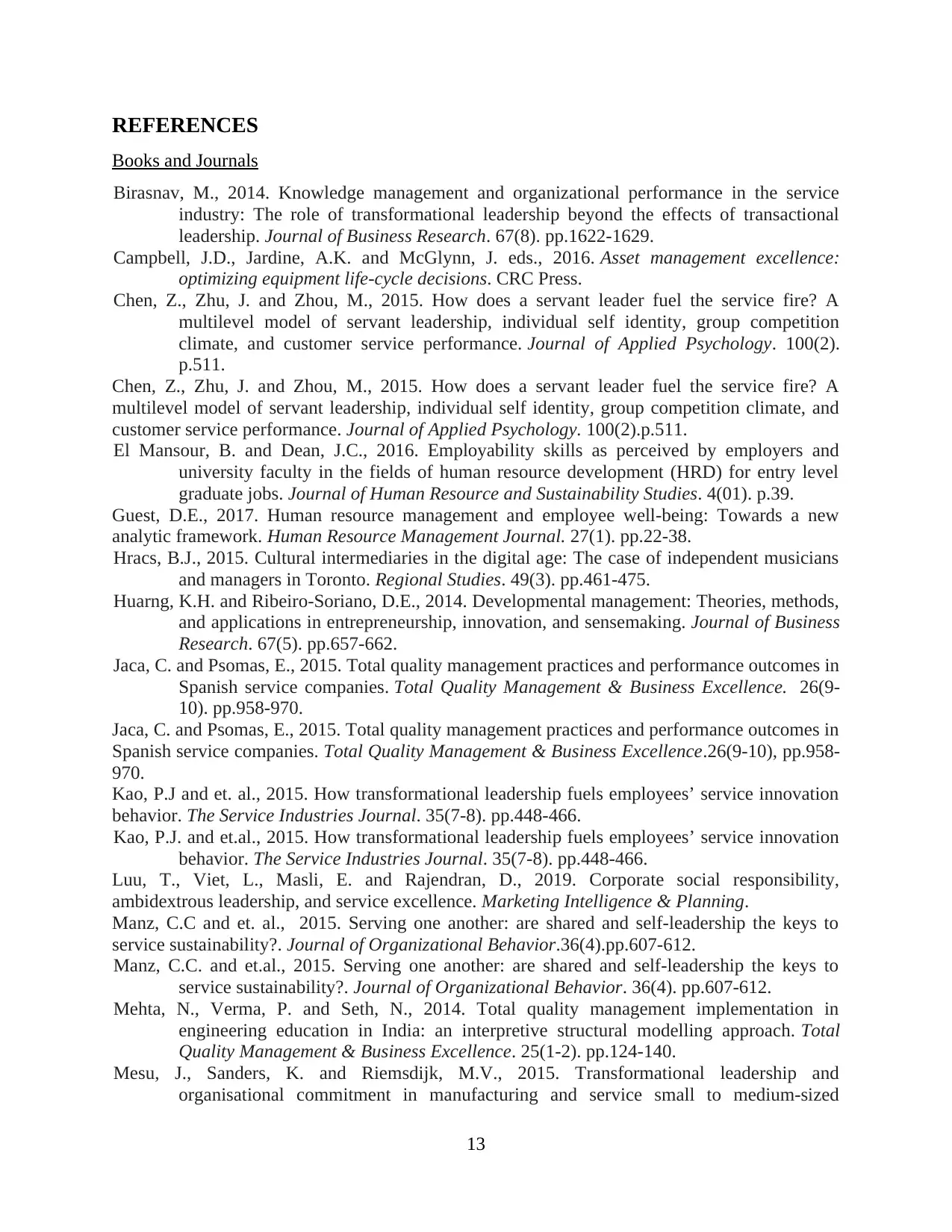
REFERENCES
Books and Journals
Birasnav, M., 2014. Knowledge management and organizational performance in the service
industry: The role of transformational leadership beyond the effects of transactional
leadership. Journal of Business Research. 67(8). pp.1622-1629.
Campbell, J.D., Jardine, A.K. and McGlynn, J. eds., 2016. Asset management excellence:
optimizing equipment life-cycle decisions. CRC Press.
Chen, Z., Zhu, J. and Zhou, M., 2015. How does a servant leader fuel the service fire? A
multilevel model of servant leadership, individual self identity, group competition
climate, and customer service performance. Journal of Applied Psychology. 100(2).
p.511.
Chen, Z., Zhu, J. and Zhou, M., 2015. How does a servant leader fuel the service fire? A
multilevel model of servant leadership, individual self identity, group competition climate, and
customer service performance. Journal of Applied Psychology. 100(2).p.511.
El Mansour, B. and Dean, J.C., 2016. Employability skills as perceived by employers and
university faculty in the fields of human resource development (HRD) for entry level
graduate jobs. Journal of Human Resource and Sustainability Studies. 4(01). p.39.
Guest, D.E., 2017. Human resource management and employee well‐being: Towards a new
analytic framework. Human Resource Management Journal. 27(1). pp.22-38.
Hracs, B.J., 2015. Cultural intermediaries in the digital age: The case of independent musicians
and managers in Toronto. Regional Studies. 49(3). pp.461-475.
Huarng, K.H. and Ribeiro-Soriano, D.E., 2014. Developmental management: Theories, methods,
and applications in entrepreneurship, innovation, and sensemaking. Journal of Business
Research. 67(5). pp.657-662.
Jaca, C. and Psomas, E., 2015. Total quality management practices and performance outcomes in
Spanish service companies. Total Quality Management & Business Excellence. 26(9-
10). pp.958-970.
Jaca, C. and Psomas, E., 2015. Total quality management practices and performance outcomes in
Spanish service companies. Total Quality Management & Business Excellence.26(9-10), pp.958-
970.
Kao, P.J and et. al., 2015. How transformational leadership fuels employees’ service innovation
behavior. The Service Industries Journal. 35(7-8). pp.448-466.
Kao, P.J. and et.al., 2015. How transformational leadership fuels employees’ service innovation
behavior. The Service Industries Journal. 35(7-8). pp.448-466.
Luu, T., Viet, L., Masli, E. and Rajendran, D., 2019. Corporate social responsibility,
ambidextrous leadership, and service excellence. Marketing Intelligence & Planning.
Manz, C.C and et. al., 2015. Serving one another: are shared and self‐leadership the keys to
service sustainability?. Journal of Organizational Behavior.36(4).pp.607-612.
Manz, C.C. and et.al., 2015. Serving one another: are shared and self‐leadership the keys to
service sustainability?. Journal of Organizational Behavior. 36(4). pp.607-612.
Mehta, N., Verma, P. and Seth, N., 2014. Total quality management implementation in
engineering education in India: an interpretive structural modelling approach. Total
Quality Management & Business Excellence. 25(1-2). pp.124-140.
Mesu, J., Sanders, K. and Riemsdijk, M.V., 2015. Transformational leadership and
organisational commitment in manufacturing and service small to medium-sized
13
Books and Journals
Birasnav, M., 2014. Knowledge management and organizational performance in the service
industry: The role of transformational leadership beyond the effects of transactional
leadership. Journal of Business Research. 67(8). pp.1622-1629.
Campbell, J.D., Jardine, A.K. and McGlynn, J. eds., 2016. Asset management excellence:
optimizing equipment life-cycle decisions. CRC Press.
Chen, Z., Zhu, J. and Zhou, M., 2015. How does a servant leader fuel the service fire? A
multilevel model of servant leadership, individual self identity, group competition
climate, and customer service performance. Journal of Applied Psychology. 100(2).
p.511.
Chen, Z., Zhu, J. and Zhou, M., 2015. How does a servant leader fuel the service fire? A
multilevel model of servant leadership, individual self identity, group competition climate, and
customer service performance. Journal of Applied Psychology. 100(2).p.511.
El Mansour, B. and Dean, J.C., 2016. Employability skills as perceived by employers and
university faculty in the fields of human resource development (HRD) for entry level
graduate jobs. Journal of Human Resource and Sustainability Studies. 4(01). p.39.
Guest, D.E., 2017. Human resource management and employee well‐being: Towards a new
analytic framework. Human Resource Management Journal. 27(1). pp.22-38.
Hracs, B.J., 2015. Cultural intermediaries in the digital age: The case of independent musicians
and managers in Toronto. Regional Studies. 49(3). pp.461-475.
Huarng, K.H. and Ribeiro-Soriano, D.E., 2014. Developmental management: Theories, methods,
and applications in entrepreneurship, innovation, and sensemaking. Journal of Business
Research. 67(5). pp.657-662.
Jaca, C. and Psomas, E., 2015. Total quality management practices and performance outcomes in
Spanish service companies. Total Quality Management & Business Excellence. 26(9-
10). pp.958-970.
Jaca, C. and Psomas, E., 2015. Total quality management practices and performance outcomes in
Spanish service companies. Total Quality Management & Business Excellence.26(9-10), pp.958-
970.
Kao, P.J and et. al., 2015. How transformational leadership fuels employees’ service innovation
behavior. The Service Industries Journal. 35(7-8). pp.448-466.
Kao, P.J. and et.al., 2015. How transformational leadership fuels employees’ service innovation
behavior. The Service Industries Journal. 35(7-8). pp.448-466.
Luu, T., Viet, L., Masli, E. and Rajendran, D., 2019. Corporate social responsibility,
ambidextrous leadership, and service excellence. Marketing Intelligence & Planning.
Manz, C.C and et. al., 2015. Serving one another: are shared and self‐leadership the keys to
service sustainability?. Journal of Organizational Behavior.36(4).pp.607-612.
Manz, C.C. and et.al., 2015. Serving one another: are shared and self‐leadership the keys to
service sustainability?. Journal of Organizational Behavior. 36(4). pp.607-612.
Mehta, N., Verma, P. and Seth, N., 2014. Total quality management implementation in
engineering education in India: an interpretive structural modelling approach. Total
Quality Management & Business Excellence. 25(1-2). pp.124-140.
Mesu, J., Sanders, K. and Riemsdijk, M.V., 2015. Transformational leadership and
organisational commitment in manufacturing and service small to medium-sized
13
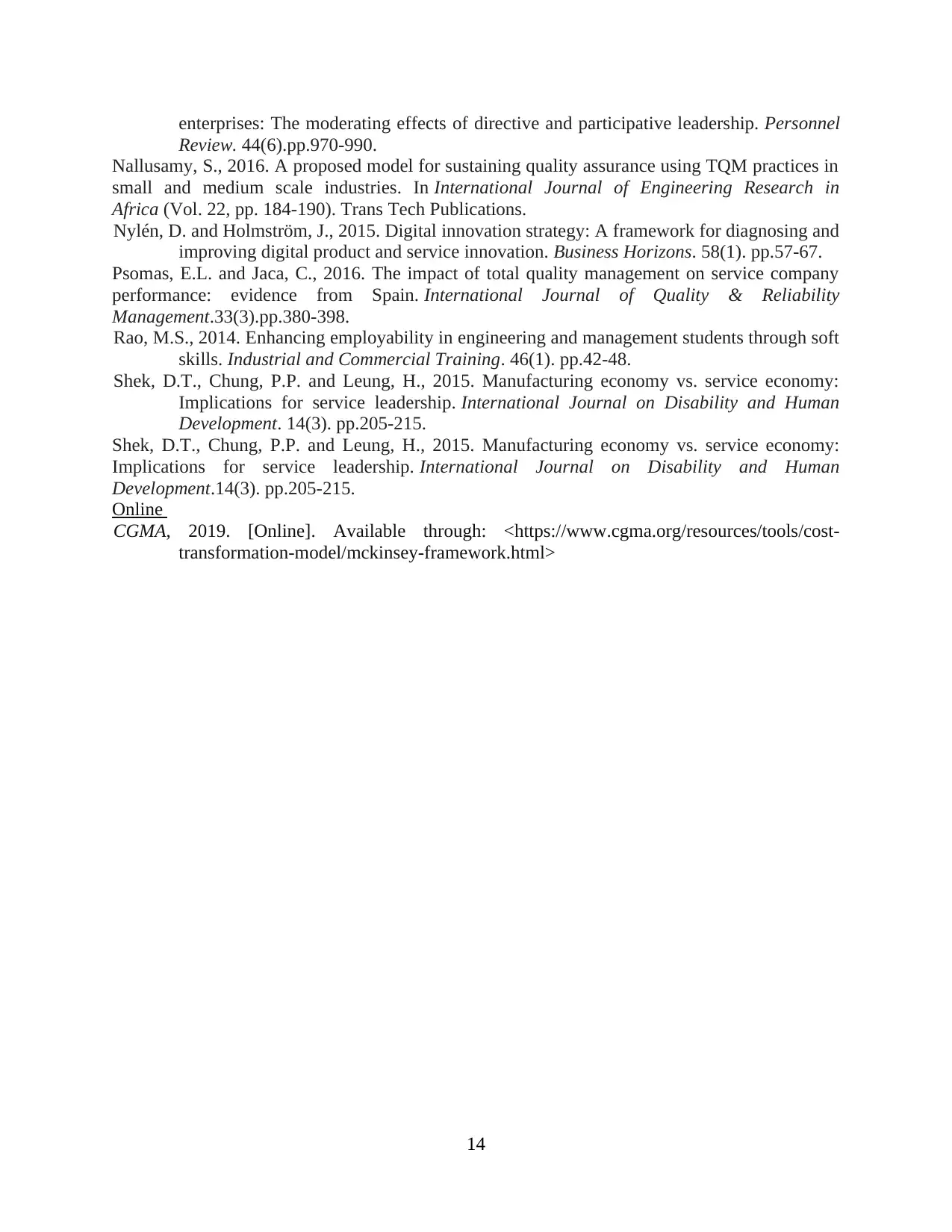
enterprises: The moderating effects of directive and participative leadership. Personnel
Review. 44(6).pp.970-990.
Nallusamy, S., 2016. A proposed model for sustaining quality assurance using TQM practices in
small and medium scale industries. In International Journal of Engineering Research in
Africa (Vol. 22, pp. 184-190). Trans Tech Publications.
Nylén, D. and Holmström, J., 2015. Digital innovation strategy: A framework for diagnosing and
improving digital product and service innovation. Business Horizons. 58(1). pp.57-67.
Psomas, E.L. and Jaca, C., 2016. The impact of total quality management on service company
performance: evidence from Spain. International Journal of Quality & Reliability
Management.33(3).pp.380-398.
Rao, M.S., 2014. Enhancing employability in engineering and management students through soft
skills. Industrial and Commercial Training. 46(1). pp.42-48.
Shek, D.T., Chung, P.P. and Leung, H., 2015. Manufacturing economy vs. service economy:
Implications for service leadership. International Journal on Disability and Human
Development. 14(3). pp.205-215.
Shek, D.T., Chung, P.P. and Leung, H., 2015. Manufacturing economy vs. service economy:
Implications for service leadership. International Journal on Disability and Human
Development.14(3). pp.205-215.
Online
CGMA, 2019. [Online]. Available through: <https://www.cgma.org/resources/tools/cost-
transformation-model/mckinsey-framework.html>
14
Review. 44(6).pp.970-990.
Nallusamy, S., 2016. A proposed model for sustaining quality assurance using TQM practices in
small and medium scale industries. In International Journal of Engineering Research in
Africa (Vol. 22, pp. 184-190). Trans Tech Publications.
Nylén, D. and Holmström, J., 2015. Digital innovation strategy: A framework for diagnosing and
improving digital product and service innovation. Business Horizons. 58(1). pp.57-67.
Psomas, E.L. and Jaca, C., 2016. The impact of total quality management on service company
performance: evidence from Spain. International Journal of Quality & Reliability
Management.33(3).pp.380-398.
Rao, M.S., 2014. Enhancing employability in engineering and management students through soft
skills. Industrial and Commercial Training. 46(1). pp.42-48.
Shek, D.T., Chung, P.P. and Leung, H., 2015. Manufacturing economy vs. service economy:
Implications for service leadership. International Journal on Disability and Human
Development. 14(3). pp.205-215.
Shek, D.T., Chung, P.P. and Leung, H., 2015. Manufacturing economy vs. service economy:
Implications for service leadership. International Journal on Disability and Human
Development.14(3). pp.205-215.
Online
CGMA, 2019. [Online]. Available through: <https://www.cgma.org/resources/tools/cost-
transformation-model/mckinsey-framework.html>
14
1 out of 16
Related Documents
Your All-in-One AI-Powered Toolkit for Academic Success.
+13062052269
info@desklib.com
Available 24*7 on WhatsApp / Email
![[object Object]](/_next/static/media/star-bottom.7253800d.svg)
Unlock your academic potential
© 2024 | Zucol Services PVT LTD | All rights reserved.





